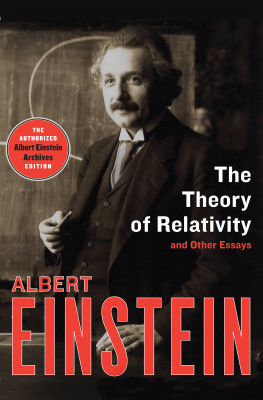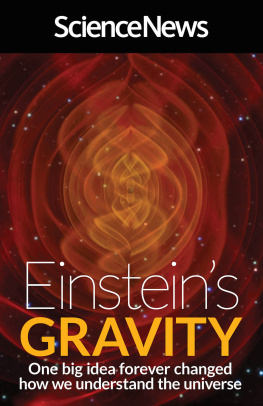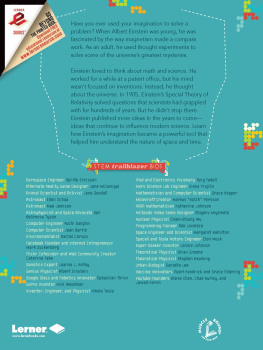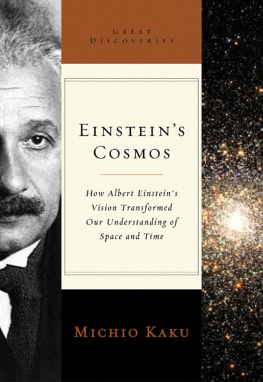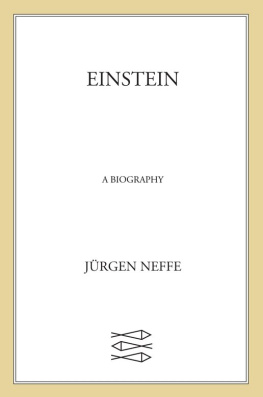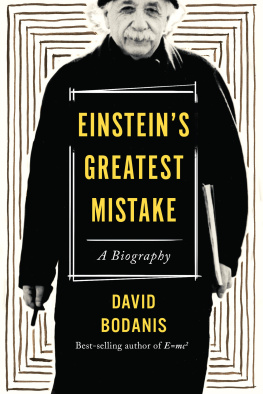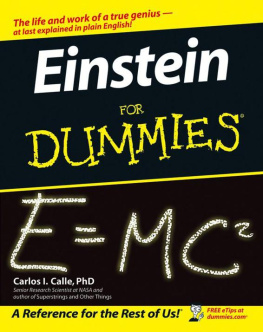EINSTEIN

Einstein
His Space and Times

STEVEN GIMBEL

Copyright 2015 by Steven Gimbel.
All rights reserved.
This book may not be reproduced, in whole or in part, including illustrations, in any form (beyond that copying permitted by Sections 107 and 108 of the U.S. Copyright Law and except by reviewers for the public press), without written permission from the publishers.
Yale University Press books may be purchased in quantity for educational, business, or promotional use. For information, please e-mail sales.press@yale.edu (U.S. office) or sales@yaleup.co.uk (U.K. office).
Set in Janson type by Integrated Publishing Solutions.
Printed in the United States of America.
Frontispiece: Albert Einstein and his wife leaving California, 1931.
Bettmann/CORBIS.
Library of Congress Control Number 2014958690
ISBN 978-0-300-19671-9 (cloth : alk. paper)
A catalogue record for this book is available from the British Library.
This paper meets the requirements of ANSI/NISO Z39.48-1992
(Permanence of Paper).
10 9 8 7 6 5 4 3 2 1
For Erin and Benjamin
CONTENTS
ACKNOWLEDGMENTS
SPECIAL THANKS TO Larry Marschall and Don Goldsmith for suggestions to the manuscript, Deirdre Mullane of Mullane Literary for support throughout the process, my editor Jeffrey Schier and all the wonderful folks at Yale University Press, and especially Erin and Ben Gruodis-Gimbel for help with the index.
EINSTEIN
Introduction
ALBERT EINSTEIN MADE a mistake. It was a miscalculation, plain and simplenot mathematical but political. A group of antisemitic German nationalists had attacked his theory of relativity at a public forum. The nonsense objections were rhetorically effective only because the audience, already biased against him, did not understand the theory or the grounds on which relativity could be legitimately questioned. Einstein was not afraid of controversy and was not about to back down from a fight, but if it was a rumble they wanted, it would be done right. They would follow the rules.
Many physicists, including some of Einsteins own heroes, objected vociferously to his theory. This was expected. After all, Einstein was offering an alternative to the laws of mechanics posited by Isaac Newton and still standing after three hundred years. Not only were Newtons successes legion, they were legend. One does not, and should not, reject the bedrock of a discipline easily. Einstein knew the process and was eager to engage in it: journal articles, correspondences with fellow physicists, and panels at conferences in which the technical details of the theory are considered, evidence in favor and against the theory is weighed and discussed, and extensions and objections are made on scientific grounds. He was sure he could win on a level playing field when opposing legitimate physicists, so these politically motivated clowns would be nothing but a nuisance.
In an open letter that Einstein published in the widely read Berliner Tageblatt, he pointed to an upcoming occasion at which a respectable conversation about relativity would occur, the annual meeting of the German Association of Scientists and Doctors in the town of Bad Nauheim. The venerable Max Planck, the most powerful and well-respected physicist of his generation, would be presiding over a discussion about relativity theory involving Einstein himself and Nobel laureate Philipp Lenard, who opposed it. Einstein figured that these cranks felt bold enough to peddle their absurdities in the comfortable confines of public meetings surrounded by allies, but the sunlight of actual scientific discourse would send them scurrying. And so he ended with a challenge: I notice that at the scientists gathering at Nauheim there has, at my suggestion, been arranged a discussion on the theory of relativity. Anyone who wants to protest can do so there and put up his ideas to a proper gathering of scientists.
It was a trap. Using a put-up-or-shut-up taunt as the bait, Einstein was sure that one of two things would happen. Most likely, they would not show up. There was no rational way these charlatans would dare try to hold their own against actual physicists. Their absence could be understood only as a concession, a tacit admission that they were full of hot air. But the alternative was more delicious; they would actually play the game of real science according to the accepted rules. In this scenario, they would be dispatched quickly and decisively, their snake oil shown for what it is. Either way, Einstein would be rid of them. It seemed a foolproof plan.
But Einstein was a theoretician, not an experimentalist, and theorieseven good onesdont always work when applied to the chaotic messiness of the real world. There was a third possibility he had not considered: these enemies of relativity showed up en masse at the session, a loud, unruly, and disrespectful mob willing to sabotage the proceedings with their jeers and chants. They did not play by the rules, but rather they tried to co-opt the meeting and force everyone else to play their game. Einstein could not easily shrug them off. They were not mere gadflies, but army ants intent on destroying anything in their way.
On the one hand, this came as no surprise to Einstein, who had left Germany at fifteen, renouncing his citizenship and promising never to return to the land of his birth exactly because he detested this sort of militant, nationalistic close-mindedness. On the other hand, the brazenness was hard to fathom. It was a sign of the times and foreshadowed dangerous things to come.
Einstein had felt the sting of antisemitism as a child, but it was after World War I that he was forced to see the depth and destructiveness that came with such hatred. His colleague, the great physicist Max von Laue, was certain that the toxic mix of nationalism, militarism, and anti-Jewish sentiment was a temporary phase in Germany and that the culture would quickly come to its senses before anything truly bad happened. Other friends went in the opposite direction; for example, Nobel laureate Fritz Haber converted and dedicated his life to nationalistic German causesespecially those of the military, becoming the father of chemical warfare. But just as Einstein predicted, such conversions would never lead to acceptance of Jewish-born Germans as authentic Germans, no matter how hard they tried or how much they personally believed they were one of them. Einstein had alienated himself from the larger Jewish community, but the times forced him to realize that his heritage was an inalienable part of who he was and who he was perceived to be. He could accept that on the grounds of those who hated him, or he could claim it for himself.
He was a pessimist, and a sarcastic one at that, but never a fatalist. Things may be bad, but you had to try to make a difference. In service of his causes, Einstein had one asset from which to derive powerhis fame. At one point, he said that he had a version of the Midas toucheverything he said turned to newsprint. He disliked being a celebrity and the disruption it caused, but when it was useful he would use it to give voice to the oppressedboth Jewish and non-Jewishand to stand up against those he saw as the oppressors. This made Einstein a political figure and thereby fair game in the ugly world politics creates. He saw German society tending down a dangerous path, and he spoke up publicly against the nationalism, bigotry, and militarism that would become National Socialism. But this led to condemnation, public attacks, even death threats.
Next page

